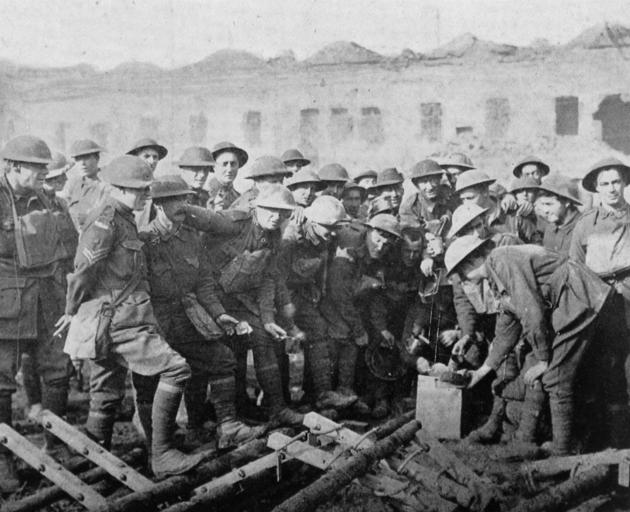
The average New Zealand soldier has a keen sense of the humorous, and is fond of a practical joke. Returned soldiers tell of one of the jokes they used to practice on the English ``Tommies''. When our soldiers heard that a Maori contingent would be coming into their camp, they would tell their soldier-comrades wild and weird stories of the savageness of the Maori - how he would make a meal of a white stranger soldier on the slightest provocation, and how they must not go near the Maoris. The Maoris would be let into the joke, and would fully carry out their part of the little stunt - rolling their eyes, pushing out their tongues, dancing hakas, and in other ways evincing a spirit of frightfulness. As a result, till the British soldiers got better acquainted with their dusky comrades, they were very frightened of them. No doubt accounts of some of these little affairs have percolated through to the German lines, and have been used by the German officers to instil a desperate courage into their men, so that they would not readily give themselves up as prisoners.
Early Southlander
One of Southland's earliest settlers, Mr William Calder, sen, who passed away at Heddon Bush on Friday last, in his eighty-second year, had much to do with the district's development and progress. Born in 1837, he like many other young men, was attracted to the colonies, and landed in Dunedin with his brother, Alexander, in the Alpine in 1859. They purchased a team, and were the first teamsters to go to Gabriel's Gully. After the rush he went to Southland, and took up land at Thornbury, and did a considerable amount of carting from Riverton to the Lakes, and got as much as 100 per ton. In 1868 he married Miss Agnes Graham at Invercargill, the officiating clergyman being the late Rev. A. H. Stobo. Mr Calder took up 200 acres of land at Heddon Bush in 1878. He subsequently purchased 282 acres when Gladfield was cut up, and acquired Mr M'Lean's farm of 200 acres at Heddon Bush. The deceased gentleman endured the hardships of pioneering days with cheerfulness and courage so characteristic of the early settlers, and gained esteem and regard. His remains were interred in the Riverton Cemetery.
Snowy wonderland
Visitors returning from Queenstown (says a Press Association telegram from Invercargill) are enraptured at the panoramic view to be obtained of Lake Wakatipu and the mountains under snow conditions which may not recur in a lifetime. They state that no scenery is comparable with that round the lake, which is thickly covered with snow to the water's edge. The view from the bend of the lake, embracing the Remarkables, the Frankton Flats, and the Crown Range in the far distance, Ben Lomond, Cecil, and Walter Peaks, and the Humboldt Ranges, and Mount Earnslaw at the Head of the Lake, makes a picture beyond description. This is heightened by sunset tints. Should the Tourist Department arrange to take a kinematograph film while the favourable weather conditions continue it would be a capital advertisement for New Zealand.
- ODT, 31.7.18.












